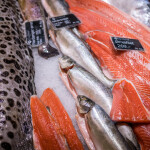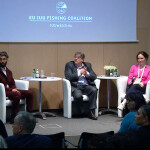Many of the criteria for creating a trustworthy traceability system for seafood supply chains have yet to be defined, according to a panel of experts who spoke on the topic at the second day of the SeaWeb Seafood Summit.
Standards must be developed for health, legality and labor concerns – and must be done soon in order to influence rule-making efforts underway in the United States and the United Kingdom, said David Schorr, the head of the World Wildlife Fund’s Transparent Seas Project.
“Now is a key window of opportunity,” Schorr said, citing key regulatory developments in the U.S. and U.K. to stop illegal, unreported and unregulated (IUU) fishing.
A lack of reliable information makes developing guidelines difficult, said Katrina Nakamura, founder of the seafood assessor Sustainability Incubator.
“We’re still at the problem definition phase,” she said. “We need to figure out what to do, who’s on the hook to do it and how we’re going to get results.”
More data collection is key for improving traceability efforts, but major sticking points are debates on what data needs to be collected, how it should be collected and how best to address concerns from industry about the proprietary sensitivity of such data.
Nakamura suggested using the traceability system for conflict minerals as a possible model, then posed the question, “Would a system of registries at all major nodes of production [in the seafood industry] give the legal assurance needed?”
Alistair McDonnell, the manager of Interpol’s Project Scale, which oversees efforts to combat illegal fishing globally, said a better method of organization for traceability could help law enforcement and policing efforts.
“It’s absolutely right we need a theory of how you’re going to organize things,” he said. “[We must] bring together the architects of different pieces of this sector and motivate them have the opportunity to make really transformative change in regulatory structures and reporting structures.”
McDonnell said any efforts to build a traceability system should ensure those lower down the supply chain have enough information to make informed choices in their buying, allowing the market to regulate itself rather than relying entirely on policing efforts.
“You want [bad actors] to be scared of [their] customers and the contractual penalties of not fulfilling orders,” McDonnell said. “The reality is, we only have time to deal with the highest threats.”






